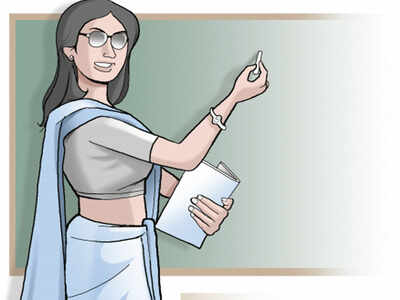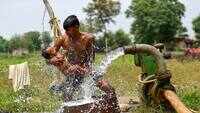
COIMBATORE: The government and aided schoolteachers have suggested the state’s expert committee that has been deliberating on school education reforms to make the student-teacher ratio 15:1 when schools reopen to ensure effective physical distancing.
In a charter of suggestions that the Tamil Nadu High and Higher Secondary School Graduate Teacher Association presented before the committee, its members also urged the state not to promote online learning, as that was creating a divide between the rich and poor students.
The association said the number of students in a classroom should be brought down to 15 from the current 35 to 40. Its state auditor T Arulanandam said, “Most government and aided schools have now added buildings and classrooms. So, 15 students in a classroom is possible.”
Pointing out that classrooms in government schools were 300sqft to 400sqft big, he said bringing down the number of students per class to 15 would not only help maintain adequate physical distancing but also help teachers provide individual attention to each student. “For instance, in a class of 15, if a student removes face mask, the teacher can find it out easily.”
In schools that do not have enough classrooms for ensuring physical distancing, they suggested the state to conduct classes in shifts – one shift in the forenoon and another in the afternoon.
Another suggestion was not to promote online learning, as that would ‘divide students into rich and poor’. Teachers said they were able to connect only 30%-40% students online. “Many students don’t have an android phone at their houses. We used to WhatsApp assignments or study materials even before the lockdown, but more than half the students could not access them,” Arulanandam said.
Instead of online learning, he said, the state’s dedicated education channel - Kalvi TV – should be used to conduct classes for students, as most households have TV sets.
The syllabus could be reduced by 25%, the association said. Instead of spending several crores of rupees for implementing the Right to Education (RTE) Act, under which the state would sponsor 25% seats in private schools for underprivileged students every year, it said, the state could use the money to develop government schools.
In a charter of suggestions that the Tamil Nadu High and Higher Secondary School Graduate Teacher Association presented before the committee, its members also urged the state not to promote online learning, as that was creating a divide between the rich and poor students.
The association said the number of students in a classroom should be brought down to 15 from the current 35 to 40. Its state auditor T Arulanandam said, “Most government and aided schools have now added buildings and classrooms. So, 15 students in a classroom is possible.”
Pointing out that classrooms in government schools were 300sqft to 400sqft big, he said bringing down the number of students per class to 15 would not only help maintain adequate physical distancing but also help teachers provide individual attention to each student. “For instance, in a class of 15, if a student removes face mask, the teacher can find it out easily.”
In schools that do not have enough classrooms for ensuring physical distancing, they suggested the state to conduct classes in shifts – one shift in the forenoon and another in the afternoon.
Another suggestion was not to promote online learning, as that would ‘divide students into rich and poor’. Teachers said they were able to connect only 30%-40% students online. “Many students don’t have an android phone at their houses. We used to WhatsApp assignments or study materials even before the lockdown, but more than half the students could not access them,” Arulanandam said.
Instead of online learning, he said, the state’s dedicated education channel - Kalvi TV – should be used to conduct classes for students, as most households have TV sets.
The syllabus could be reduced by 25%, the association said. Instead of spending several crores of rupees for implementing the Right to Education (RTE) Act, under which the state would sponsor 25% seats in private schools for underprivileged students every year, it said, the state could use the money to develop government schools.

Coronavirus outbreak
Trending Topics
LATEST VIDEOS
City
 5-star Taj Mansingh in the heart of Lutyens' Delhi to become Covid-19 facility, five more hotels named
5-star Taj Mansingh in the heart of Lutyens' Delhi to become Covid-19 facility, five more hotels named  Andhra Pradesh: Remains of ancient Lord Shiva temple found during sand mining process in Nellore
Andhra Pradesh: Remains of ancient Lord Shiva temple found during sand mining process in Nellore  Galwan Valley clash with China: Telangana soldier Colonel Santosh Babu martyred
Galwan Valley clash with China: Telangana soldier Colonel Santosh Babu martyred  Respite in temperature in Delhi-NCR in upcoming days: IMD
Respite in temperature in Delhi-NCR in upcoming days: IMD
More from TOI
Navbharat Times
Featured Today in Travel
Quick Links
Kerala Coronavirus Helpline NumberHaryana Coronavirus Helpline NumberUP Coronavirus Helpline NumberBareilly NewsBhopal NewsCoronavirus in DelhiCoronavirus in HyderabadCoronavirus in IndiaCoronavirus symptomsCoronavirusRajasthan Coronavirus Helpline NumberAditya ThackerayShiv SenaFire in MumbaiAP Coronavirus Helpline NumberArvind KejriwalJammu Kashmir Coronavirus Helpline NumberSrinagar encounter
Get the app



